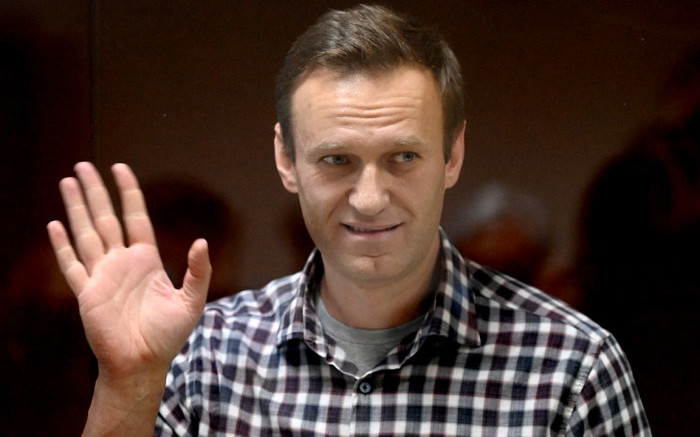
Authorities transferred Russia’s most prominent opposition politician to an isolated penal colony three months before a presidential election that is expected to give Vladimir Putin a fifth term in office.
In this file photo, Russian opposition leader Alexei Navalny stands in a glass cell during a court hearing at the Babushkinsky District Court in Moscow on February 20, 2021. Image: AFP
MOSCOW (AP) — Jailed Russian opposition leader Alexei Navalny has been moved to an Arctic penal colony, allies said Monday, after his whereabouts were unknown for more than two weeks.
Authorities transferred Russia’s most prominent opposition politician to an isolated penal colony three months before a presidential election that is expected to give Vladimir Putin a fifth term in office.
“We found Alexei Navalny,” his ally Kira Yarmysh said on social media.
“He is now in IK-3 in the settlement of Kharp in the Yamal-Nenets Autonomous Okrug,” Yarmysh added. “His lawyer visited him today. Alexei is fine.”
The Kharp district, home to about 5,000 people, lies above the Arctic Circle.
It is “one of the northernmost and most remote colonies,” said Ivan Zhdanov, who heads Navalny’s anti-corruption foundation.
“The conditions there are harsh, with a special regime in the permafrost zone” and very little contact with the outside world, Zhdanov said.
Washington welcomed reports that the dissident was eventually found alive, but criticized Moscow for its “malicious attacks on Navalny and the more than 600 other political prisoners that Russia has detained.”
The State Department said it remained “deeply concerned about Mr. Navalny’s well-being and the conditions of his unjustified detention.”
It said it joined Navalny’s family and supporters in calling for “his immediate release without conditions” and called on Russia to “end its escalating suppression of independent voices in Russia.”
France condemned the transfer. A State Department spokeswoman said Russia had committed “flagrant human rights violations.”
“ISOLATE ALEXEI”
Navalny mobilized large anti-government protests before being jailed in 2021 after surviving an assassination attempt on him by poisoning.
He initially spent most of his imprisonment in the penal colony IK-6, about 250 kilometers east of Moscow in the Vladimir region.
A court extended his prison sentence to 19 years on extremism charges.
It was also decided that he should be transferred to a tougher special prison that normally houses particularly dangerous prisoners.
After weeks of uncertainty, Navalny was found in IK-3 – “Polar Wolf” – a strict regime colony.
He could be transferred to the nearby penal colony No. 18 “Polar Owl,” where an even harsher regime prevails.
In Russia, it is common for transfers to take weeks as prisoners are slowly transported by rail between distant facilities.
But the complete lack of information about his whereabouts had raised concerns among allies, human rights groups and Western governments.
Navalny’s allies said they had sent requests to over 600 detention centers.
“There was a complete ban on information about him,” Zhdanov said.
Allies believe the Kremlin aimed to further isolate the vocal critic.
“It was clear from the beginning that the authorities wanted to isolate Alexei, especially before the elections,” Zhdanov said.
Russia will hold a presidential election in March 2024, with Putin the undisputed favorite.
Several pro-Kremlin parties are expected to field candidates for the vote, but the real opposition has been left out.
Moscow has been weakening Russia’s independent politicians and activists for years, a crackdown that intensified after the Kremlin ordered Russian troops into Ukraine in 2022.
Navalny’s movement in particular is the target of the Kremlin’s repression.
Even before the offensive in Ukraine, Navalny’s organization was declared extremist, which made it easier to prosecute members and supporters.
Several regional heads of the Anti-Corruption Foundation were detained.
Among them was Lilia Chanysheva, Navalny’s ally in the central republic of Bashkortostan, who was sentenced to seven and a half years in prison this summer.
Many prominent allies have fled, including Maria Pevchikh, who runs the Anti-Corruption Foundation from abroad and for whom a Russian arrest warrant was issued last week.






Recent Comments